LOS ANGELES – Streaming platform Montage is bringing a six-film retrospective of renowned Chinese documentary filmmaker Du Haibin to North American audiences beginning September 25, 2021. Du Haibin is widely recognized as one of the most acclaimed and active documentary directors in China.
He belongs to the Sixth Generation of Chinese filmmakers characterized as being responsible for recording the lives of ordinary Chinese people at a time of rapid urbanization and great economic disparity. Since his first documentary Doudou (1999), shot on a camcorder, Du Haibin has built a wide-ranging, thought-provoking, socially-conscious body of work that earns him a spot in contemporary Chinese cinema alongside Jia Zhangke, Wang Bing, and Zhou Hao.
The retrospective covers six of Du Haibin’s feature-length documentaries which are formally diverse and adventurous, as well as thematically consistent with a relentless focus on the marginalized and the disadvantaged. Representative of his style and preferences, selected films include Along the Railway, Du Haibin’s first breakthrough film, Young Patriot, a Toronto Film Festival selection that explores passionate patriotism in China`s youths born after 1990, and 1428, a 2009 Venice Film Festival winner about the survivors of the Great Sichuan Earthquake. Among the six films, Stone Mountain (2006) is available for streaming in the US for the first time. The retrospective will be available on the streaming platform Montage at www.montageplay.com along with other hand picked documentary and narrative films from Asian filmmakers.
DU HAIBIN
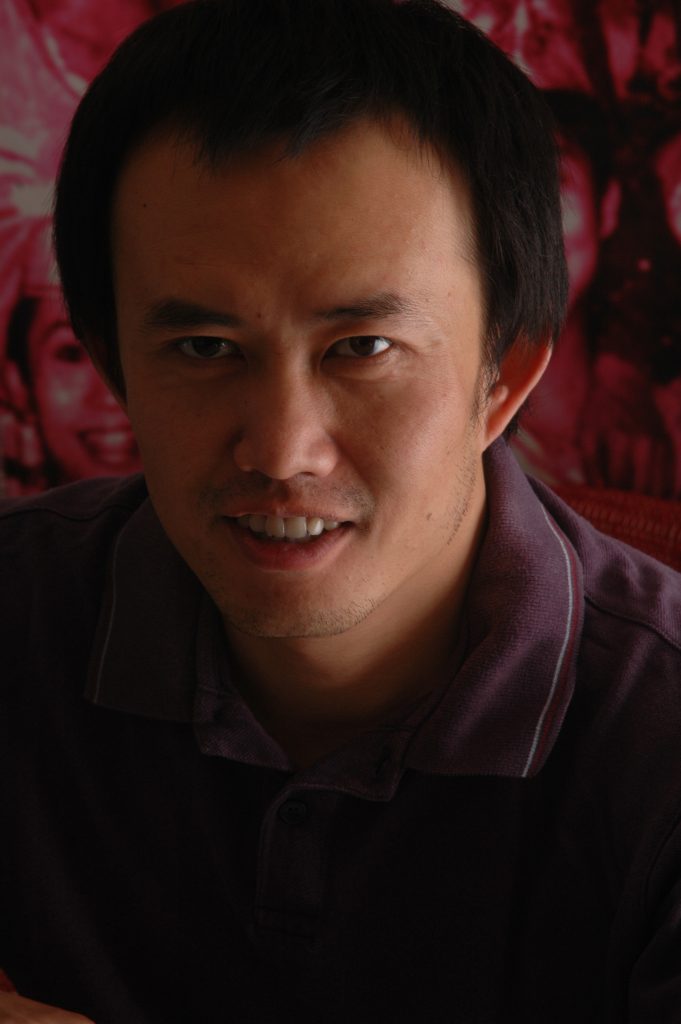
Du Haibin 杜海滨 (born in Xi’an China, 1972) is an independent documentary director with a background in Photography and Fine Arts. He made his first documentary Doudou when he was a student at Beijing Film Academy, with a Panasonic VHS camcorder gifted from his sister. Du Haibin graduated from the Beijing Film Academy in 2000 and since then he has directed numerous documentaries and fictions. Why does he choose to make documentaries? Du Haibin said, “I remember when I watched Robert J. Flaherty’s Nanook of the North, I was so deeply moved by it. Documentaries give me more freedom than a feature film would. I feel a responsibility to record people’s lives fairly and objectively during these times of change. I’m glad that through my work I can experience different kinds of life. This is important to me, to my life. Every time I re-watch my work it feels like re-reading some very old books. Very special.”
In 2007 his documentary “Umbrella…” won an Honorable Mention at the 30th Cinéma du réel International Documentary Film Festival. In 2009 his documentary, 1428, was screened at the 66th Venice International Film Festival winning an Orizzonti Prize for Best documentary. In 2015, his latest documentary feature “A Young Patriot” was screened at Sheffield Docs/Fest and won the Jury Prize at the 39th Hong Kong International Film Festival.
MONTAGE
Montage (montageplay.com) is a streaming platform that curates independent films, documentaries and shorts from Asia and Asian diasporas for an international audience. Founded by Hollywood and Silicon Valley veterans in 2020, Montage currently offers free and premium content ad-free, on demand.
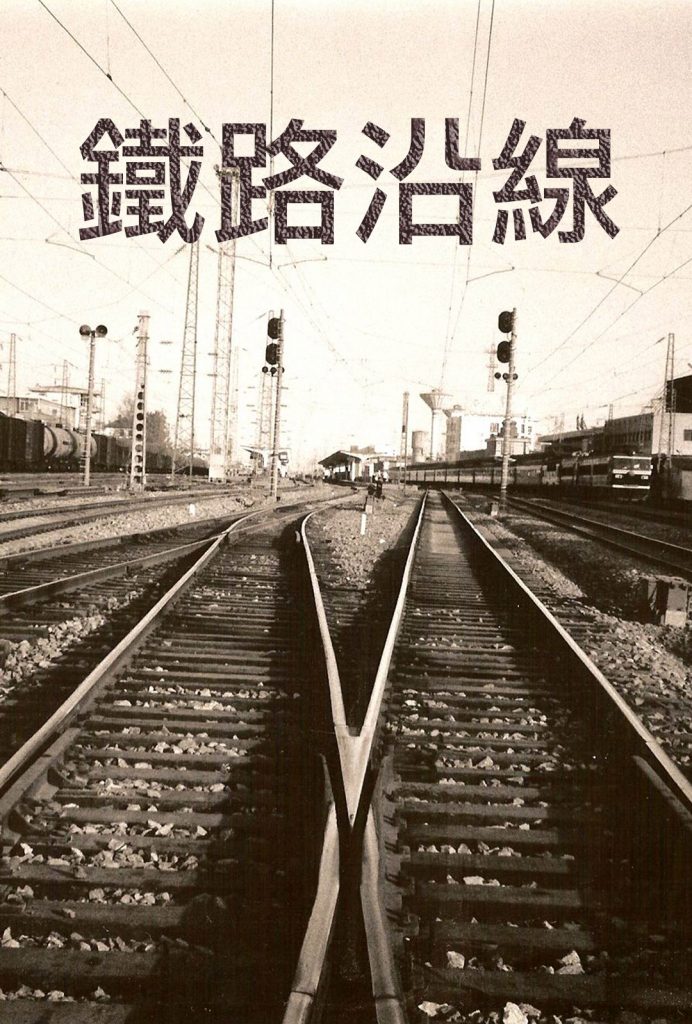
FILM PROGRAM
Along the Railway 铁路沿线
Documentary | 2000 | 100 min | SD | Mandarin | English & Simplified Chinese Subtitles
It is winter 2000 in Baoji City, Shanxi Province. A group of waifs and strays are playing on the dump ground of the railway station. These new peripheral people of modern China come from all over the country. In the daytime, they wander in the city and in the evening they sleep along railways. To make a living, they glean and collect scraps or empty bottles to sell for a few bucks. Among them, Zhou Fu drifted to Baoji because he had lost his money and ID card; Li Xiaolong and Huo Hongchang escaped from the Detention Center For Street Kids; Little Yunnan was maltreated by his former boss; Feng Xiang decided to run away from home because of forced marriage imposed by his parents. They spend the first Chinese Lunar New Year in the new century with such a big family reorganized along the railway. Through a series of extraordinarily frank interviews, rarely captured elsewhere, the director elicits a range of moving tales revealing not only a gamut of problems – from child abuse, loss of work, to psychological illness – but also
the strays’ determined hopes and dreams.
Along the Railway was selected into the Yamagata International Documentary Film Festival and received Special Mention in their New Asian Currents section.
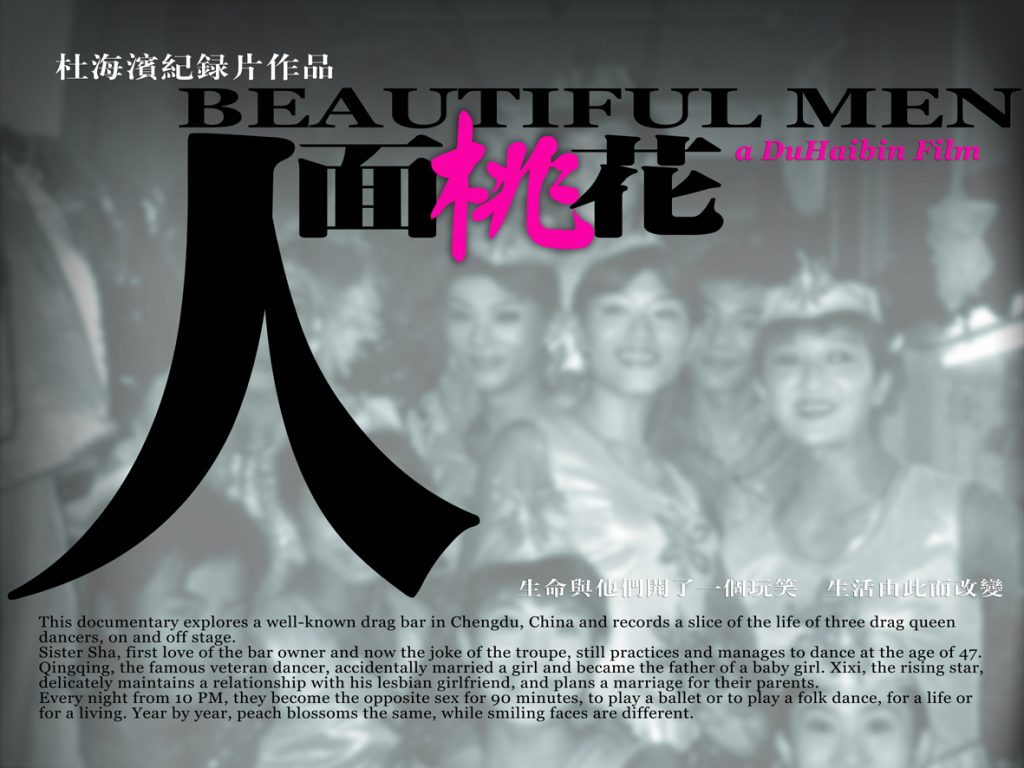
Beautiful Men 人面桃花
Documentary | 2005 | 100 min | HD | Mandarin | English & Simplified Chinese Subtitles
The film Beautiful Men depicts the lives of gay men in the city of Chengdu, Southwest China. Presented using the split-screen method, the film examines the lives of three drag dancers on and off stage. Sister Sha, who was the bar owner and is now the joke of the troupe, still practices and manages to dance at the age of 47. Qingqing, a famous veteran dancer, marries a woman and becomes the father of a baby girl. Xixi, the rising star, delicately maintains a performative relationship with his lesbian girlfriend and plans a fake marriage to appease their parents. No matter what challenges they face outside the bar, they still gather every night to perform a drag show featuring everything from ballet to folk dances.
Beautiful Men was the Winner of Best Documentary Award at the Busan International Film Festival 2005.
Stone Mountain 石山
Documentary | 2006 | 122 min | HD | Mandarin | English Subtitles
Fifty kilometers northwest of Beijing, there is a mountainous region rich in granite. With the rapid urban expansion, the government has contracted farmers to mine the land. Many farmers do not own any land themselves and come from far and wide to cut the enormous stone cubes that will eventually pave city streets or build modern houses. Shot across different seasons, the documentary follows four family members who struggle in the cold, rain and snow to cut the granite as precisely as possible. Far away from their home, these miners share everything they have with one another. They cook, sleep and live together in a small barracks for most of the year, only leaving once to return to their families to celebrate the Spring Festival in their hometowns. Filmed in cinéma-vérité style, this visually stunning documentary provides us with dramatic insight into the struggle of workers in today’s China.
Stone Mountain was selected for the 2005 Busan International Film Festival’s AND Dongseo Asia Fund and premiered at the 2006 Busan International Film Festival.
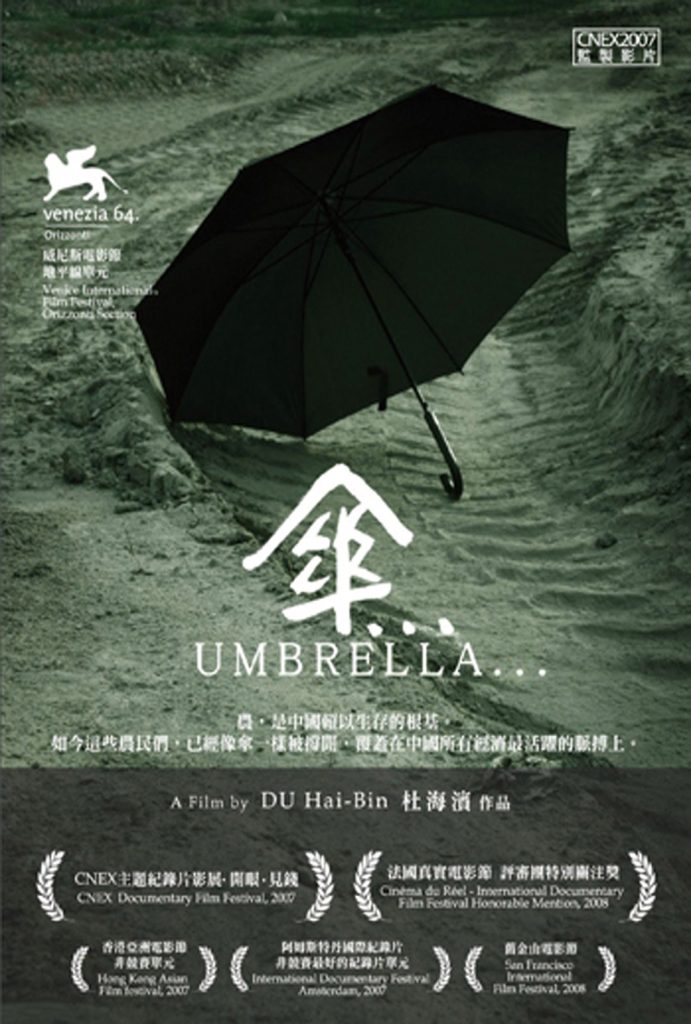
Umbrella… 伞
Documentary | 2007 | 93 min | HD | Mandarin | English & Traditional Chinese Subtitles
“Umbrella… is a prosaic documentary anchoring on contemporary rural Chinese society” commented Du Haibin. The five-parts documentary metaphorically links the lives of five core groups that characterized China’s pre-reform society—workers, merchants, students, soldiers and farmers. Since the late 1960s, living conditions improved and countless people traded the countryside for the city, hoping for a better life. The film follows workers in a factory where umbrellas are made, umbrella sellers at a wholesale warehouse, soldiers in training, students looking for a part-time jobs, and farmers waiting for the rain to come. The film was shot in the months leading up to, during and after the rainy Spring Festival. Without comment, music, or interviews, the director films the people and their activities. In the factory, the camera pans through the crowded hall, making it clear what high-speed assembly line work really entails. Next, we see equally static images of long aisles in a wholesale warehouse, and shops that all sell umbrellas.
The people ‘at home’ still harvest the wheat by hand. A farmer wonders whether he should sell his land after another bad year for crops. As this subtle film indicates, China has become more prosperous, but not everybody is prospering. It tears apart the apparent economic prosperity and exposes the embarrassing reality in today’s rural China.
In an era of opportunism, restlessness and vanity, “Haibin offers an intensely personal close-up of his subjects and their struggles, observing their daily routines, their moments of weakness, their camaraderie and their isolation.” (Deanna Quinones, San Francisco International Film Festival)
Umbrella… premiered at the 64th Venice International Film Festival as part of the Horizons Documentary program, and it garnered honorable mention at the 30th Cinéma du Réel Film Festival.
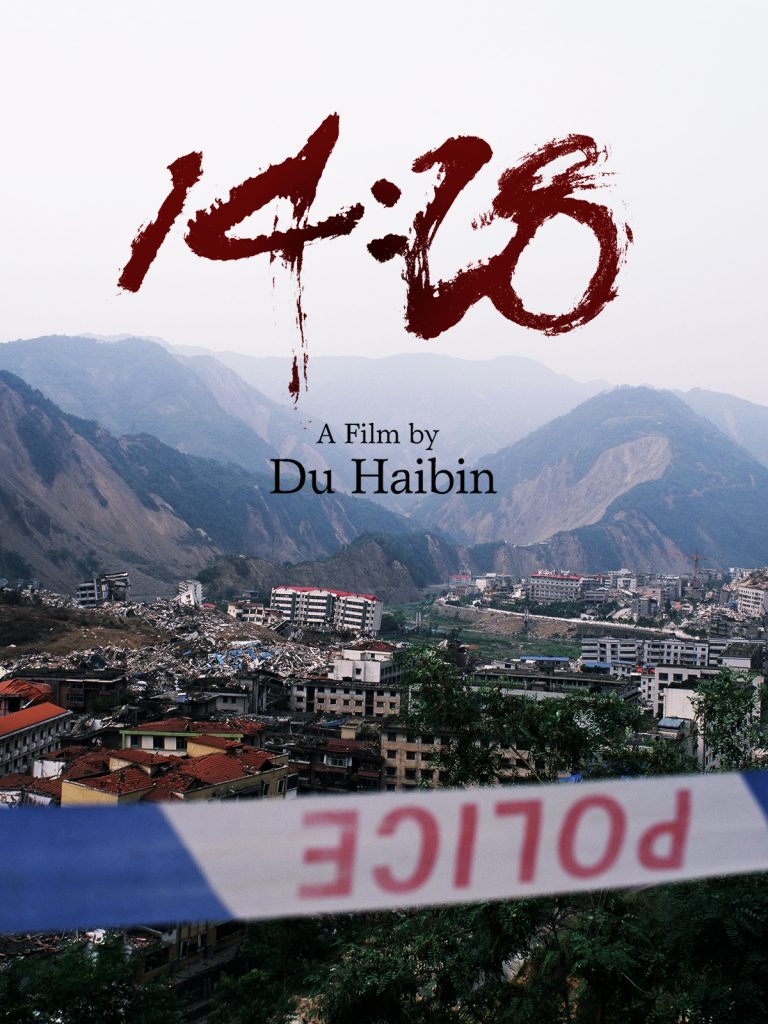
1428
Documentary | 2009 | 118 min | HD | Mandarin and Sichuan Dialect | English & Simplified Chinese Subtitles
The Great Sichuan Earthquake rocked China on May 12, 2008 at 14:28 in the afternoon, leaving more than 69,000 people dead and 15 million displaced. Ten days later, celebrated filmmaker Du Haibin arrived in Beichuan, the hardest-hit town, and began filming this remarkable documentary, capturing the stunned reactions of the villagers, the horrific damage to homes and livelihoods, and the torments that official media coverage overlooked. Sidestepping the highly controlled media tours, Du found scenes not seen on official TV, exposing the gap between the Party’s promises and the disaster victims’ reality. Beyond describing the disaster and its consequences, the director also examines the prominence of media and consumerism in contemporary China: tourists buy DVDs of horrific post-earthquake footage, souvenir albums of corpses, and pose for photos at sites of the highest death tolls. Du depicts a world in chaos, both material and moral.
Using a poetic, elliptical narrative structure, Du Haibin delivers a vision of human devastation that is ‘fascinating, beautifully crafted’ (Ronnie Scheib, Variety). ‘Without judgment but with a deep compassion for their subjects, the filmmakers of 1428 bring us a myriad of individual stories of absurdity, confusion, and grief ‘(Cherise Fong, CNN). 1428 has won a number of awards, including Best Documentary at the 2009 Venice International Film Festival.
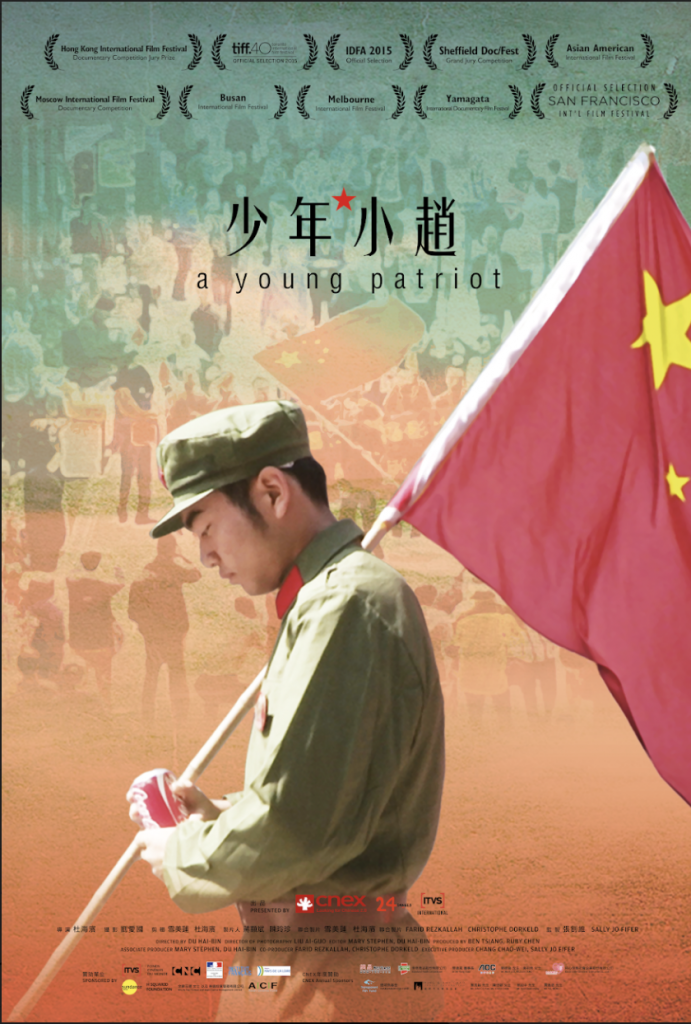
A Young Patriot 少年*小赵
Documentary | 2015 | 106 min | HD | Mandarin | English & Traditional Chinese Subtitles
Nineteen-year-old Xiao Zhao is a patriot through and through, and a great fan of Mao Zedong. He often marches in an old Red Army uniform through the streets of his hometown of Pingyao, inciting his comrades to rise up against the Japanese “occupation” of the Diaoyu Islands. He dreams of first studying photography at university, then serving his country in the army. Not as an officer, but as a regular soldier in a restive border region. Only then can he realize his full potential in the service of the Chinese people. During the four years that we follow Xiao, many of his ideals are dashed. He watches, dispirited, as corruption continues to dominate local politics and the Chinese urge to build impacts his family’s prosperity. Slowly but surely, he’s transformed from a die-hard supporter of the Communist Party into a cynic. An intriguing and at times astonishing portrait of a young man who initially comes across as a fanatic, but thanks to his openness, honesty and emotional candor quickly wins our sympathy.
A Young Patriot was selected into numerous film festivals including Toronto International Film Festival, San Francisco International Film Festival, Yamagata International Documentary Film Festival and Sheffield International Documentary Festival. It won the Jury Prize at the 39th Hong Kong International
Film Festival.
For China Film Insider’s readers, get 20% off using this discount code CHINAFILMINSIDER. Read more Montage





